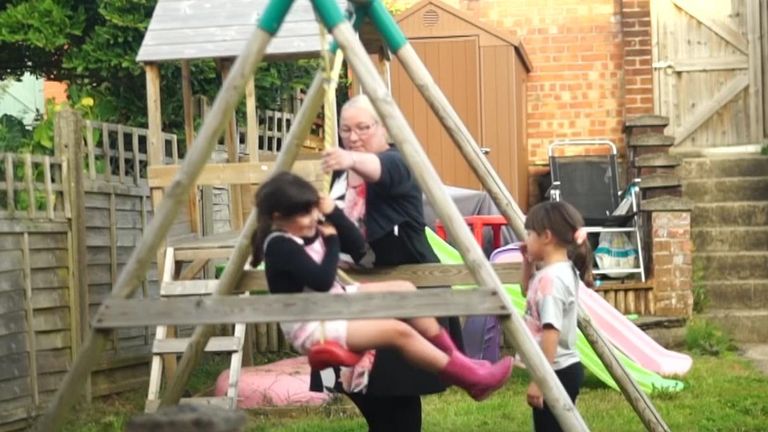Stacey Oakley is a full-time sales executive – she’s never needed to claim benefits in her life, until one day she had no choice.
Her partner Matt was killed three years ago in a car accident on the road they live on.
He was just 28. She was left to bring up their daughters, aged just two and four at the time.
March: Budget 2021 – What did Rishi Sunak announce?“I got down there, I saw the aftermath and knew he wasn’t coming home. I watched them put the sheet over his body before they told me that he’d gone. And my life just turned upside down in one split second.”
Stacey is now one of the six million households claiming Universal Credit – a benefit introduced for both employed and unemployed people.
AdvertisementAt the start of the pandemic, Universal Credit was increased by £20 per week, but this will end at the beginning of October. Things were already tough for Stacey.
More on Universal Credit Tax hikes, benefit cuts, social care, the crisis in Afghanistan: Boris Johnson faces grilling from MPs as parliament returns ‘We keep on struggling’: Families on Universal Credit prepare for life without the £20 uplift Work and Pensions Secretary Therese Coffey resists calls to make £20 Universal Credit uplift permanent as devolved governments urge top-up to be kept beyond October deadline Universal Credit: Ministers from Scotland, Wales and Northern Ireland call on UK government to keep £20 uplift ahead of deadline Conservative MPs call on Boris Johnson to make temporary £20 Universal Credit uplift permanent ahead of October deadline ‘Biggest overnight cut in benefits since Second World War’: Joseph Rowntree Foundation voices fears over end of Universal Credit uplift Image: Stacey is one of the six million households claiming Universal Credit“Everything has to be budgeted down to a T. So everything has to be fine-tuned. I have to know exactly what money I need to come out just to cover the basics of gas, water, electricity bills… there’s nothing left at the end of the month.”
But she says the cut will hit her family hard.
“It’ll be robbing Peter to pay Paul and looking for ways to cut back. Looking for ways that you can spend less on the shopping, which I know is going to cost me more, it’s worrying about how to heat the home over winter because that all goes up. Last winter I had cereal for tea at times just to cut down on the bills.”
Research by the charity Action for Children has revealed that working families will be facing the biggest overall drop in their benefits income since 2010.
Hairdressers, shelf stackers and carers will be among those working families facing the biggest overall drop in their benefits income since 2010 when the cut to Universal Credit goes ahead next month, according to new research by charity Action for Children.
The charity found after analysing a typical sole-earner family with two children in a selection of common low- to middle-income jobs, the findings show hairdressers will be worst off, losing an average of £1,982 a year after the cut, followed by pharmacy assistants (£1,946 average annual loss) and shelf stackers (£1,843).
Families prepare for life without Universal Credit upliftImran Hussain, director of policy for Action for Children, said: “I think the government has got to level with people that the majority of those who are affected by next month’s cuts are working families.
“You can’t level up the country if you’re pushing down living standards of working people. We’re talking about here hairdressers, care workers, shop workers, not big earners, but people who are proud to work, proud of the job they do, proud of the fact that they’re working to support their families.
“What we need is a recognition from the government that these families need help at the moment.”
The Department For Work and Pensions said: “As announced by the chancellor at the budget, the uplift to Universal Credit was always temporary. It was designed to help claimants through the economic shock and financial disruption of the toughest stages of the pandemic, and it has done so.
“Universal Credit will continue to provide vital support for those both in and out of work and it’s right that the government should focus on our Plan for Jobs, supporting people back into work and supporting those already employed to progress and earn more.”
